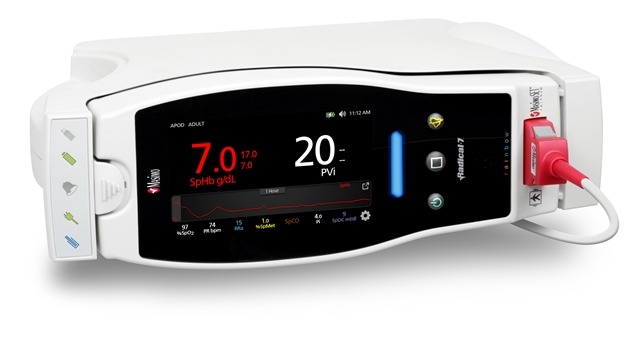SpHb, noninvasive, continuous hemoglobin monitoring, provides real-time visibility to changes to hemoglobin between invasive blood samples

Image: Masimo Radical-7 with SpHb. Photo: courtesy of Business Wire.
Masimo announced the findings of an abstract recently presented at the American Society of Anesthesiologists (ASA) 2019 Annual Meeting.
In this independent study, researchers at Fukuoka University in Japan evaluated whether using Masimo SpHb could help avoid postoperative anemia and inappropriate blood transfusion in patients undergoing total hip arthroplasty (THA) and total knee arthroplasty (TKA).
SpHb, noninvasive, continuous hemoglobin monitoring, provides real-time visibility to changes to hemoglobin between invasive blood samples.
Noting that anemia and blood transfusion are related to morbidity and mortality in surgical patients, Dr. Nakamori and colleagues sought to determine the utility of SpHb monitoring in avoiding postoperative anemia and inappropriate blood transfusion. Patients undergoing THA or TKA were randomly assigned to either an SpHb-guided group (n=73) or routine care (control) group (n=72). In both groups, patients were continuously monitored using SpHb, but in the control group clinicians were blinded to the SpHb data and blood transfusion decisions were made according to traditional clinical signs such as blood loss and hemodynamic parameters.
Hemoglobin (Hb) was measured invasively using a laboratory hematology analyzer on the first postoperative day (POD1), with a target Hb value of ≥ 8 g/dL for all patients. The researchers defined two types of blood transfusion as inappropriate: excessive blood transfusion, defined as transfusion of patients with Hb > 12 g/dL, and delayed blood transfusion, defined as transfusion of patients with Hb < 8 g/dL.
The researchers found that Hb on POD1 was not significantly different between the SpHb and control groups, nor was there a significant difference in blood transfusion between both groups. However, in the control group, 7 patients received inappropriate blood transfusion (5 excessive, 2 delayed). No patients received inappropriate blood transfusion in the SpHb group (p = 0.002).
The researchers concluded, “Postoperative monitoring of SpHb cannot reduce blood transfusion nor [have an] effect on Hb at POD1, but it can prevent accidental and transient anemia, and excessive or delayed blood transfusion in patients undergoing THA and TKA.”
SpHb is not intended to replace laboratory blood testing. Clinical decisions regarding red blood cell transfusions should be based on the clinician’s judgment considering among other factors patient condition and laboratory diagnostic tests using blood samples. The transfusion threshold of 8 g/dL was predetermined by the study protocol and may not be appropriate for all patients.
Masimo is a global medical technology company that develops and produces a wide array of industry-leading monitoring technologies, including innovative measurements, sensors, patient monitors, and automation and connectivity solutions.
Source: Company Press Release
